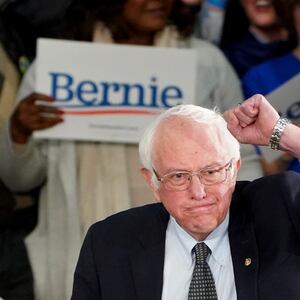The Jewish vote in presidential elections always goes to the Democrats, with only a small percentage going to the GOP. In 2016, Hillary Clinton received 71 percent of it, while Donald Trump got only 24 percent. It’s a small vote—just 3 percent of the total in 2016, according to exit polls—but it’s important because in states like Florida, that small percentage could mean the difference between victory and defeat.
If Bernie Sanders becomes the nominee of the Democratic Party in 2020, that could tilt things toward defeat.
A recent Pew Research Poll reveals that 31 percent of American Jews support Joe Biden for the nomination, while only 11 percent support Sanders. While 13 percent of Jews approve of Trump’s performance as president, 48 percent do not. Twenty-four percent of Jews say they will vote for Trump in 2020, matching his 2016 support, but just 57 percent say they’ll vote for the Democratic candidate.
ADVERTISEMENT
The Jewish vote is certainly not a monolith. Some Jews will support Trump because they agree with his Israel policy while disagreeing on domestic policies; others don't agree with Sanders but might vote for him anyway because they think it important to cast their vote for a candidate, who if he wins, would be the first Jewish president in the United States.
Nevertheless, as Frank Newport shows in Polling Matters, most American Jews support Israel and want a presidential candidate to be pro-Israel. He writes: “The overwhelming majority of Jews were more sympathetic to Israel than the Palestinians in 2001-2014, and I see no signs that this relationship has changed in a meaningful way in recent years.” Today, 86 percent of Jews are sympathetic to Israel, according to the results of a 2015-2019 poll sample. It declined a bit from an earlier sample, but Newport writes that it “is not meaningfully different from the 93% we found in the 2001-2014 sample.”
On Sunday, Sanders tweeted that he would not attend the forthcoming AIPAC conference, because the pro-Israel lobbying group provides a platform “for leaders who express bigotry and oppose Palestinian rights.” Immediately, he was met with a barrage of criticism from mainstream liberal Jewish groups. Jonathan Greenblatt, CEO of the Anti-Defamation League, who came from the Obama administration, called Sanders’ tweet “offensive” and “irresponsible.” Similar remarks came from David Harris, head of the American Jewish Committee, and from Rabbi Rick Jacobs, president of the Union for Reform Judaism, and from the Jewish Democratic Council of America. Their followers are likely not to vote for Sanders should he get the nomination.
On domestic matters, American Jews, outside of the Orthodox communities, have been liberal since the days of F.D.R. and the New Deal. They have supported social reform, government measures to help the poor, and civil rights for African-Americans. Many times, Jewish groups have proudly displayed the photo of Martin Luther King. Jr. marching in Selma, Alabama in 1965. Standing in the front row with King is the prominent Rabbi, Abraham Joshua Heschel.
New York City was the exception in the 1930s and 40s, when Jewish trade unionism flourished, and a portion of working-class Jews in the city predominated in the ranks of the American Communist Party. One section of the city in the Bronx was called “the Red Belt,” since its voters regularly cast their ballots on the line of the American Labor Party, which was taken over by the Communists in the 1940s. But during the Cold War, New York Jews deserted the ALP and supported a new liberal line created by a prominent anti-Communist who led the hatters’ union, called the Liberal Party.
To try and maintain the Jewish vote, Sanders has noticeably begun to identify himself publicly as Jewish, in contrast to his presidential campaign in 2016, when he described his ethnicity as Polish. Last Tuesday, his campaign released a new video in which he proudly identifies himself as a Jew, emphasizes that many in his father’s family perished in the Holocaust, and calls attention to the growing threat of anti-Semitism in America.
Sanders also goes after Donald Trump, and a neo-Nazi group is shown on camera explaining that Trump’s election emboldened them.
Sanders also wrote a short column about his Jewish identity late last year for Jewish Currents. In his article, titled “How to Fight Antisemitism in America,” Sanders, referring to the 2018 attack on the Tree of Life synagogue in Pittsburgh, wrote that “President Donald Trump’s own words helped inspire the worst act of antisemitic violence in American history.” Declaring “I am a proud Jewish American,” he said that anti-Semitism is not only a threat to Jews, “it is also a threat to democratic governance itself.”
He could have picked any of several mainstream Jewish publications to make his views known, but true to his socialist ideals, he chose to proclaim his Jewish identity in Jewish Currents, a small-circulation left-wing magazine that began publishing decades ago as a publication of the American Communist Party, and later, became a magazine identified with young Jewish New Leftists, and in this era as a publication speaking to the concerns of today’s young Jewish radicals.
Sanders is also anxious to show that he supports Israel. He explained that “I have a connection to Israel going back many years. In 1963, I lived on a kibbutz near Haifa. It was there that I saw and experienced for myself many of the progressive values upon which Israel was founded. I think it is very important for everyone, but particularly for progressives, to acknowledge the enormous achievement of establishing a democratic homeland for the Jewish people after centuries of displacement and persecution.”
In other words, he is not anti-Israel, as many have argued. New York Times columnist Nicholas Kristof seconded that, writing in a recent column, “The accusation that Sanders, who lived on an Israeli kibbutz for a time and would be the first Jewish president, is anti-Israel is absurd.”
What Sanders did not explain, but which the Times of Israel did, is that the kibbutz he lived and worked in was not associated with the mainstream labor Zionist-socialist movement, but was part of a youth group affiliated with the far-left Mapam, called Hashomer Hatzair. Its members considered themselves Marxist-Leninists and Zionists, who supported the Soviet Union and its foreign policy during the Cold War years. Indeed, when Stalin died, its newspaper, On Guard, ran the headline "The Progressive World Mourns the Death of J.V. Stalin."
Being in such a kibbutz doesn’t mean he couldn’t have been pro-Israel, of course. It’s just interesting that he glossed over that part of it, which could come up during a general election campaign.
Moreover, Sanders’ campaign’s official surrogates, who often appear with Sanders or speak on his behalf, include the virulently anti-Israel Rep. Rashida Tlaib of Michigan, who supports the BDS movement, and Rep. Ilhan Omar of Minnesota. (You can find what they said that is anti-Semitic in Noah Rothman’s column). To give you one example, in 2012, Omar spoke about “the evil doings of Israel,” and later argued that it was money—“It’s all about the Benjamins, baby”—that explained American Jews’ support of Israel. As for Tlaib, she said after her election that her colleagues in the House who oppose BDS “forgot what country they represent,” thus repeating an old anti-Semitic trope.
Then, last Tuesday, Sanders added a third person to his list of surrogates, another openly anti-Zionist individual, an Arab-American named Amer Zahr, who describes himself as a comedian, activist, and professor. His tweets reveal his outlook.

And these:

These extreme views are hardly going to be seen as worthy by most liberal Jews, including those opposed to expansion of settlements and Benjamin Netanyahu’s foreign and domestic policy, including his outreach to authoritarian populist leaders in Europe.
It takes little imagination to see what the right and the Trumpists will do with this information. They will portray Sanders as a communist-leaning opponent of Israel, who appoints as surrogates individuals whose claim to fame is strong opposition to Israel.
On Tuesday, Matt Brooks, chairman of the Republican Jewish Coalition, went on Fox and Friends to say that if Sanders was elected, he would be “the first enemy of Israel in the White House." One needn't endorse that view to see what an issue this is going to be. Brooks also said this group would be premiering an anti-Sanders ad during Tuesday's night's debate on CBS. He didn't mention that it would only air in Florida, Ohio, Pennsylvania, and Arizona.
At the Tuesday Democratic debate in Charleston, South Carolina, the candidates were asked what they would do about the Trump administration moving the U.S. embassy in Israel from Tel Aviv to Jerusalem. “Would you move the U.S. embassy back to Tel Aviv?,” CBS moderator Major Garrett asked Sanders. “The answer is, it’s something we would take into consideration,” Sanders answered, while calling Netanyahu a “reactionary racist.”
Already, some Jewish voters in Florida are suspicious about whether the Democrats really support Israel. Of course, most Democrats do, but Trump’s attacks on a Sanders campaign would do a lot to disabuse them of that notion. If they decide not to vote for Sanders and leave the line blank while some vote for Trump, an election rout in Florida, and across the country, will be the result.







